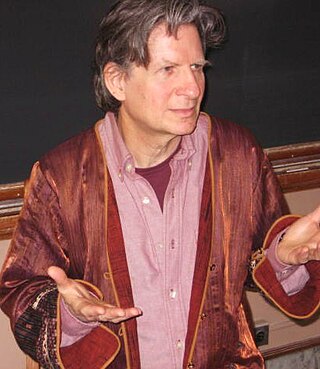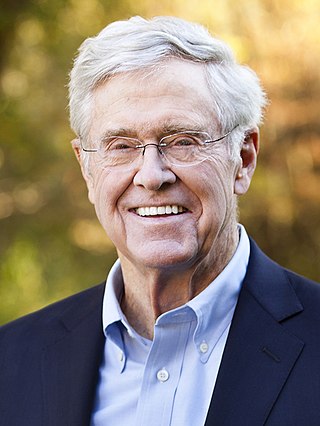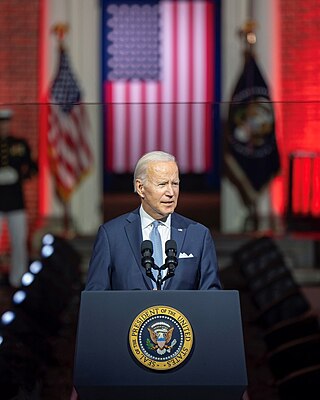Radical centrism, also called the radical center, the radical centre, and the radical middle, is a concept that arose in Western nations in the late 20th century. The radical in the term refers to a willingness on the part of most radical centrists to call for fundamental reform of institutions. The centrism refers to a belief that genuine solutions require realism and pragmatism, not just idealism and emotion.
Philip Ernest Converse was an American political scientist. He was a professor in political science and sociology at the University of Michigan who conducted research on public opinion, survey research, and quantitative social science.

Mark Ivor Satin is an American political theorist, author, and newsletter publisher. He is best known for contributing to the development and dissemination of three political perspectives – neopacifism in the 1960s, New Age politics in the 1970s and 1980s, and radical centrism in the 1990s and 2000s. Satin's work is sometimes seen as building toward a new political ideology, and then it is often labeled "transformational", "post-liberal", or "post-Marxist". One historian calls Satin's writing "post-hip".
Bipartisanship, sometimes referred to as nonpartisanship, is a political situation, usually in the context of a two-party system, in which opposing political parties find common ground through compromise. In multi-partisan electoral systems or in situations where multiple parties work together, it is called multipartisanship. Partisanship is the antonym, where an individual or political party adheres only to its interests without compromise.
Nonpartisanship, also known as nonpartisanism, is a lack of affiliation with, and a lack of bias towards, a political party.
An independent voter, often also called an unaffiliated voter or non-affiliated voter in the United States, is a voter who does not align themselves with a political party. An independent is variously defined as a voter who votes for candidates on issues rather than on the basis of a political ideology or partisanship; a voter who does not have long-standing loyalty to, or identification with, a political party; a voter who does not usually vote for the same political party from election to election; or a voter who self-describes as an independent.
Transpartisan, or transpartisanship, represents an emerging paradigm of political thought which accepts the validity of truths across a range of political perspectives and seeks to synthesize them into an inclusive, pragmatic container beyond typical political dualities. It is distinct from bipartisanship, which aims to negotiate between "right" and "left", resulting in a dualistic perspective, and nonpartisanship, which tends to avoid political affiliation altogether.
A partisan is a committed member of a political party. In multi-party systems, the term is used for persons who strongly support their party's policies and are reluctant to compromise with political opponents.
A nonpartisan blanket primary is a primary election in which all candidates for the same elected office run against each other at once, regardless of the political party. Partisan elections are, on the other hand, segregated by political party. Nonpartisan blanket primaries are slightly different from most other elections systems with two rounds/a runoff, also known as "jungle primaries" , in a few ways. The first round of a nonpartisan blanket primary is officially the "primary." Round two is the "general election." Round two must be held, even if one candidate receives a majority in the first round.
Scientists and Engineers for America (SEA) was an organization focused on promoting sound science in American government, and supporting candidates who understand science and its applications. SEA was formed on September 27, 2006, and describes itself as non-partisan.
"Wingnut", wing nut or wing-nut, is a pejorative American political term referring to a person who holds extreme, and often irrational, political views. It is a reference to the extreme "wings" of a party, and shares a name with the hardware fastener also known as a wingnut.

"Bring Us Together" was a political slogan popularized after the election of Republican candidate Richard Nixon as President of the United States in the 1968 election. The text was derived from a sign which 13-year-old Vicki Lynne Cole stated that she had carried at Nixon's rally in her hometown of Deshler, Ohio, during the campaign.

Charles de Ganahl Koch is an American billionaire businessman. As of February 2024, he was ranked as the 23rd richest man in the world on the Bloomberg Billionaires Index, with an estimated net worth of $64.9 billion. Koch has been co-owner, chairman, and chief executive officer of Koch Industries since 1967, while his late brother David Koch served as executive vice president. Charles and David each owned 42% of the conglomerate. The brothers inherited the business from their father, Fred C. Koch, then expanded the business. Koch Industries is the largest privately held company by revenue in the United States, according to Forbes.
The Michigan model is a theory of voter choice, based primarily on sociological and party identification factors. Originally proposed by political scientists, beginning with an investigation of the 1952 Presidential election, at the University of Michigan's Survey Research Centre. These scholars developed and refined an approach to voting behaviour in terms of a voter's psychological attachment to a political party, acknowledging cleavages on a group level, which would be continued over the next two decades.

Anti-abortion movements, also self-styled as pro-life movements, are involved in the abortion debate advocating against the practice of abortion and its legality. Many anti-abortion movements began as countermovements in response to the legalization of elective abortions.
The Congressional Caucus for Women's Issues is a bipartisan membership organization within the House of Representatives committed to advancing women's interests in Congress. It was founded by fifteen Congresswomen on April 19, 1977, and was originally known as the Congresswomen's Caucus. Its founding co-chairs were Representatives Elizabeth Holtzman (N.Y.-Dem.) and Margaret Heckler (Mass.-Rep.). In 1981, men were invited to join and the name of the organization was therefore changed to the Congressional Caucus for Women's Issues. However, in January 1995, the U.S. House of Representatives voted to eliminate funding for offices and staff of caucus organizations on Capitol Hill; therefore, the Congresswomen reorganized themselves into a Members' organization. It is still called the Congressional Caucus for Women's Issues, but men no longer belong to it. Today its membership consists of all women in the U.S. House of Representatives.
The Center for the Political Future is a non-partisan center housed in the University of Southern California's Dornsife College of Liberal Arts and Sciences. The center was established in order to combat uncivil political discourse and promote bipartisan, fact-based dialogue on national issues. The Center for the Political Future hosts conferences, offers a Fellows program, hosts an ongoing dialogue series called Political Conversations, and provides a neutral ground for political discourse in "off-the-record policy workshops" with top experts from relevant disciplines, among other programs.

Political polarization is a prominent component of politics in the United States. Scholars distinguish between ideological polarization and affective polarization, both of which are apparent in the United States. In the last few decades, the U.S. has experienced a greater surge in ideological polarization and affective polarization than comparable democracies.
American politics has often settled into a two party system, which as well as involving conflict between the two parties has also involved long periods of bipartisanship.

The Battle for the Soul of the Nation was a speech given by U.S. President Joe Biden on September 1, 2022, two months before the 2022 midterm elections. It was televised during prime time from the front of Philadelphia's Independence Hall. Biden was critical of Donald Trump and Republicans adhering to the Make America Great Again movement.





